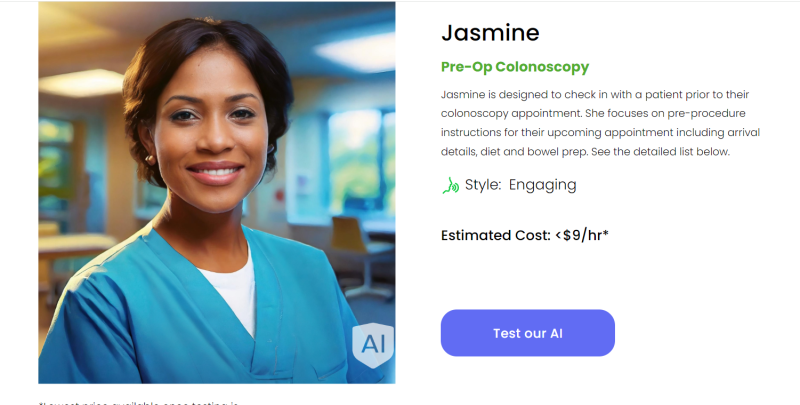Launched out of stealth about a year ago, Hippocratic AI launched its first generative AI product and pocketed $53 million in series A funding, the startup announced Monday.
The fresh funding boosts the company's valuation to $500 million, according to executives. Hippocratic has raised $120 million to date, including a $50 million seed round last May.
As AI in healthcare takes off, major investors are placing their bets. Hippocratic is backed by Premji Invest, General Catalyst, SV Angel and Andreessen Horowitz (a16z) Bio + Health.
The startup also has a handful of health system investors-- Memorial Hermann Health System, Cincinnati Children’s, WellSpan Health, Universal Health Services (UHS), HonorHealth and OhioHealth.
Munjal Shah, a serial entrepreneur, founded Hippocratic AI along with a group of physicians, hospital administrators, healthcare professionals and artificial intelligence researchers from El Camino Health, Johns Hopkins, Washington University in St. Louis, Stanford, Google, and Nvidia.
The series A round was significantly oversubscribed, allowing the company to select lead investors who were patient enough to allow the company to prioritize safety over short-term revenue and profit, according to executives.
The startup aims to build out what it refers to as the first large language model for healthcare with an initial focus on non-diagnostic, patient-facing applications.
The company also released its first product for phase three safety testing: a generative AI-based, task-specific healthcare agent. Hippocratic said it will use the new capital to fund these safety tests and to accelerate further product development, executives said.
The staffing marketplace enables health systems, payers, and others to “hire” auto-pilot generative AI-powered agents to conduct low-risk, non-diagnostic, patient-facing services to help address the massive shortage of healthcare nurses, social workers and nutritionists in the U.S. and worldwide.

Initial roles for these generative AI healthcare agents include chronic care management, post-discharge follow-up for specific conditions such as congestive heart failure and kidney disease, as well as wellness and social determinants of health surveys, health risk assessments and pre-operative outreach. However, these agents won’t be allowed to speak with patients unsupervised until phase three of the safety testing is completed, executives said.
"Since the founding of Hippocratic AI a year ago, the company trained its foundational model, achieved a key safety threshold, identified novel use cases to solve the healthcare staffing crisis, and established partnerships with 40 health systems, payers, and digital health companies,” Hemant Taneja, General Catalyst CEO and managing director, in a statement.
“Hippocratic AI has grown rapidly due to sound execution and strategy, while prioritizing safety. The company is a leading standard of radical collaboration at work and will play a critical role in transforming our healthcare system to make it more proactive, affordable, and equitable.”
The company also is collaborating with Nvidia to use its AI platform to develop empathetic AI healthcare agents to enable super-low-latency conversational interactions. User tests repeatedly show that super low latency voice interaction is required for patients to build an emotional connection naturally. Since LLMs run on inference engines, Hippocratic AI has termed this low latency inference: “Empathy Inference.”
At Nvidia GTC, a global AI developer conference, the two companies showcased the potential of a generative AI healthcare agent avatar with the Nvidia Avatar Cloud Engine suite of technologies, which brings digital humans to life with generative AI.
The agent calls patients on the phone, follows up on care coordination tasks, delivers preoperative instructions and performs post-discharge management.
“Our digital assistants provide helpful, timely and accurate information to patients worldwide,” said Munjal Shah, co-founder and CEO of Hippocratic AI. “Nvidia ACE technologies bring them to life with cutting-edge visuals and realistic animations that help better connect to patients.”
Nvidia CEO Jensen Huang demonstrated "Diana" an AI care manager (video) at the event on Monday.
The company developed a clinician-driven safety testing system for LLMs. Phase one testing was conducted by physicians and nurses to ensure the agent completes all critical checklist items with the patient for a given use case. Phase two testing required testing to be completed by more than 1,000 licensed U.S. nurses, and more than U.S. licensed physicians talking to the AI while acting as a patient. Phase three testing, which begins now, requires the testing to be completed by 5,000 licensed nurses, 500 licensed physicians, and the company’s health system partners, the company said.
In the earlier phases of testing, 1,002 US licensed nurses and 130 U.S. licensed physicians were asked to act as patients and speak to the company’s agents in a variety of use cases. After each encounter, they were asked to assess the product on subjective and objective safety measures and compare the product to real nurses and other LLMs such as GPT4 and LLaMA 2 70B Chat.
Study participants rated the AI agent on par with U.S. licensed nurses on multiple dimensions. On objective criteria, the medium-size AI agents significantly outperformed much larger general-purpose LLMs like GPT-4 in medical accuracy and safety, according to a research paper published this week.
In the past year, the company has formed AI oversight groups, including a safety governance council, a Physician Advisory Council, and a Nurse Advisory Council.
For phase three testing, Hippocratic AI will ask its 40-plus partners to test the safety of this novel generative AI-based product. These partners include HonorHealth, Cincinnati Children’s, OhioHealth, Roper St. Francis Healthcare, Universal Health Services, ELNA, SonderMind, Vital Software, Capsule, Evernow, HarmonyCares, Guidehealth, University of Vermont Health Network, Memorial Hermann Health System, Fraser Health and Side Health. The company also will expand testing with more licensed nurses and physicians.